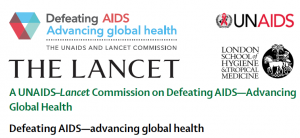“We will win or lose the fight against AIDS in next five years”: UNAIDS and Lancet commission report
1 August 2015. Related: Treatment access, On the web.
 Simon Collins, HIV i-Base
Simon Collins, HIV i-Base
On 25th June 2015, UNAIDS and the Lancet jointly called for the urgency of scaling up investment in HIV over the next five years following the results of a commission to defeat AIDS. [1]
The commission was charged with developing a programme to end AIDS that moved from the millennium development goals (MDGs) – that were focused on the poorest countries – to the new international funding model of sustainable development goals (SDGs) based on a theory of the interdependence of all countries.
The 52-page report was launched at a symposium held at the London School of Hygiene and Tropical Medicine (LSHTM).
The analysis is based on four key HIV epidemic scenarios: hyper-endemic, generalised, IDU-driven and concentrated. In all four models, AIDS deaths continue increasing to 2030 if efforts are maintained at the current level.
Speaking at the launch, Michel Sidibé, Executive Director of UNAIDS stressed that “health is not a cost but an investment”. The commission reported that increasing investment in both treatment and prevention to match the global 90:90:90 goals (90% diagnosed, 90% on treatment, 90% undetectable) would generate financial benefits of US $1157 billion between 2015 and 2030.
Seven sections in the report cover on the current health threat, review evidence for interventions, new programmes and investment models.
The report highlights the importance of looking at details of specific epidemics and the people who are most affected in each region.
Peter Piot, currently head of LSHTM, emphasised the importance of involving activists at every stage: “Activism is a driver: people living with HIV often know better about what works than academics sitting here or in Geneva”. Together with other speakers, and throughout the report, the issue of improving access to many of the highest risk people who are often actively discriminated against globally including young women, gay men, people who use drugs, transgender people and sex workers.
Even in the UK, a high income country with free healthcare – five gay men (notably not “MSM – a terrible term”) test HIV positive each day. He stressed “this is about sex – not robots in a mathematical model”.
The report and supporting documents are published as open access publications on the Lancet website.
A report from the UK STOPAIDS coalition of organisations focused on the UK response published a related report on global AIDS calling on DFID to contribute to this five-year plan. [2]
The UK is currently the only G7 country that has increased its overseas spending because this is set in relation to overall GDP (at 0.7%).
Reference
- A UNAIDS–Lancet Commission on Defeating AIDS—Advancing Global Health. (25 June 2015).
http://www.thelancet.com/commissions/defeating-aids-advancing-global-health - STOPAIDS. Towards a DFID strategy on global health. (June 2015).
http://stopaids.org.uk/uk-has-one-off-opportunity-to-end-aids-and-tb-epidemics
This article was first published online on 26 June 2015.

